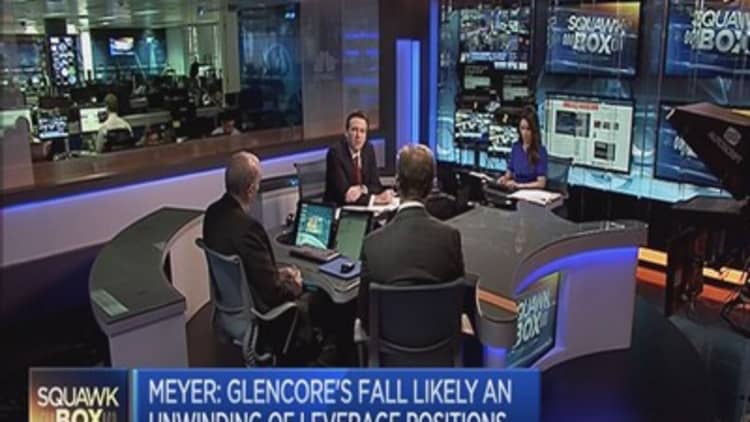Glencore has suffered a torrid few weeks of downgrades and all-time lows prompting some analysts to question whether the commodity and mining giant's debt mountain is sustainable.
But the downward spiral in the company's London-listed share price was halted Tuesday, as the company's stock rebounded, rallying as much as 20 percent to trade around 80p after a host of brokers came out in support of the group and the company released a statement reassuring investors of its creditworthiness.
Analysts at Citigroup, Bernstein, UBS and Credit Suisse all issued notes on the Anglo-Swiss commodity and mining group, maintaining a "buy" rating with price targets ranging between 170p and 450p.
Senior Bernstein analyst Paul Gait was the most bullish on the stock as he noted that the firm's industrial assets still generate positive cash margins even at a time of severe commodity price weakness.
Citi and UBS both said the stock was heavily oversold and that the divestments the firm is planning over the next six months have more potential upside than the $2 billion outlined by Glencore.
Following the wave of support from Wall Street, shares picked up, extending gains after the group issued a statement saying it had taken "proactive steps to position our company to withstand current commodity market conditions."
"Our business remains operationally and financially robust – we have positive cash flow, good liquidity and absolutely no solvency issues. We are getting on and delivering a suite of measures to reduce our debt levels by up to $10.2 billion."
"Glencore has no debt covenants and continues to retain strong lines of credit and secure access to funding thanks to long term relationships we have with the banks," the group said in a statement.
Glencore's share price tumbled some 30 percent on Monday to an all-time low of 66p after an Investec note questioned whether there was any equity value left in mining companies like Glencore and Anglo American if major commodity prices remain at current price levels.

Read More Glencore tanks another 29%: Who's next?
The group's share price is now down close to 75 percent so far this year, having lost about 50 percent in the last month alone, down from its stock market debut of 530p per share in 2011.
Concerns about China have hit the mining sector hard, with the price of raw materials including copper, coal and oil, some of Glencore's key mined commodities, close to levels not seen since their global financial crisis
"For us really, yesterday's pricing action has little to do with fundamentals," vice president of investment strategy and global research at Credit Suisse, Dan Scott, said, who also rates the stock a "buy" and is hesitant to offload the firm's bonds at current levels.
"Even the most bearish out there on the sell-side and I think its Nomura, has a sell target of about 120p share."
"What you saw going into yesterday's session, was very weak data out of China on industrial production and another re-pricing of macro risk and probably macro hedge funds were out there pushing down the Glencore share price," Scott added.
Going private?
Analysts led by Heath Jansen at Citi said in the event that the equity market continues to express its unwillingness to value the business fairly, the company management should take the company private.
This would allow restructuring measures to be taken "easily and quickly, with a potential float of just the industrial business occurring further down the track," Jansen said in a note to clients published on Tuesday.
Read MoreCopper heads for bear market as confidence vanishes
Head Global Natural Resources at Investec Jeremy Wrathall, who runs the team that were responsible for the note that weighed so heavily on Glencore's shares on Monday said such a move was not a good idea.
"I think a lot of shareholders would have a significant issue with that, given it was floated at £5 per share. But I am sure there lots of options on the table for them," Wrathall told CNBC.
Speaking on the note that pushed shares down some 30 percent Monday, Wrathall said: "It hit a nerve, and we can't avoid that – the market is telling you something."


